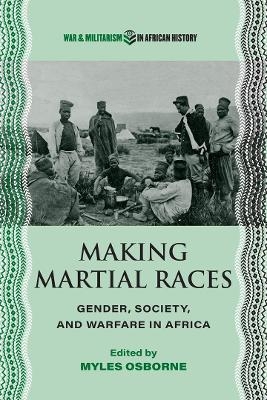
Making Martial Races
Ohio University Press (Verlag)
978-0-8214-2617-3 (ISBN)
European colonizers in Africa required the service of local soldiers and military auxiliaries to uphold their power. These African men were initially engaged by the expeditions of European surveyors and explorers during the late nineteenth century, then quickly pressed into service in the notorious campaigns of pacification. Two world wars further expanded both the numbers of African soldiers in European employ and the roles they played; many of these men would continue their jobs into the era of decolonization in the 1960s and 1970s.
Colonial administrators and military planners often chose their recruits based on the notion of “martial race”—a label that denoted peoples supposedly possessing an inborn aptitude for warfare and fighting. But the notion always obscured more than it revealed: few Europeans could agree on which “races”—or ethnic groups—were “martial,” and in any case, the identities of those groups changed continuously. Nevertheless, this belief remained a fundamental, guiding principle of the European presence in colonial Africa.
The concept of “martial race” remains an awkward and ill-fitting Eurocentric category until African contributions, perspectives, and agencies are considered. “Martial race” was never a label neatly affixed by European administrators; rather, African peoples both contested its terms and shaped its contours. This book therefore takes as its starting point the idea of martial race and recasts it as a zone in which African men and women negotiated with their European counterparts, as well as with one another.
The contributors to this volume take a broad approach to the topic, one that minimizes divisions between the precolonial, colonial, and postcolonial eras, and thinks through how cultural practices and notions of warfare and martial traditions shifted and were transformed from one period into another. These scholars’ research touches on a wide variety of subjects, including
-efforts to think about culture and martial race;
-the intersection of ethnic identity and the creation of “tribes” with colonial martial race theory;
-the connection between colonial ethnography and constructions of martial subjectivities;
-the role of gender in shaping martial notions;
-the contribution of women to creating or disputing martial identities;
-the idea of martial race as it intersected with slavery;
-warring traditions and economies of honor as avenues for staking claims to martial genealogies; and
-claims to special status by veterans of anticolonial revolutionary wars.
Myles Osborne is an associate professor of history at the University of Colorado, Boulder. He is the author of Ethnicity and Empire in Kenya: Loyalty and Martial Race among the Kamba, c. 1800 to the Present, coauthor of Africans and Britons in the Age of Empires, 1660–1980, and editor of The Life and Times of General China: Mau Mau and the End of Empire in Kenya.
List of Illustrations
Acknowledgments
Introduction: Martial Races in African History MYLES OSBORNE
1 In Mombasa They Are “Like Prisoners” to the Mijikenda: Martiality, Trade, and Inland Influences on a Swahili Port City DAVID BRESNAHAN
2 Martial Races in Alawite and French Protectorate Morocco: Black Soldiers, Slavery, and Women’s Labor in the Abid al-Bukhari and Tirailleurs Sénégalais SARAH J. ZIMMERMAN
3 A Question of Interpretation: Warfare and Martial Race Theory in West Africa SARAH DAVIS WESTWOOD
4 “Black Skin, White Heart:” The Construction of the Martial Race Category in French West Africa STÉPHANIE SOUBRIER
5 Women, Militarism, and Martial Identities among the Acholi of Northern Uganda, 1800–1962 LUCY TAYLOR
6 “To Cool the Hot Blood of a Martial Race:” Balancing Zulu Martiality and British Colonial Anxieties, 1879–1906 LIZ TIMBS
7 “Brotherhood That Binds the Brave:” Sudanese Soldiers and the Paradox of Martial Identities in the Age of Empire RON LAMOTHE and MICHELLE MOYD
8 From “Savage” to “Serviceable:” Changing Attitudes toward a Martial African Society in German East Africa STEVEN FABIAN
9 The Yoruba as a “Martial Race:” The History of an Idea and Its Alternatives, 1890–1960 OLIVER COATES
10 From Martial Races to a People’s Army: Decolonization and Martial Identity in Tanzania CHARLES G. THOMAS
Afterword: Martial Races in Africa and India HEATHER STREETS-SALTER
Contributors
Index
| Erscheinungsdatum | 21.12.2023 |
|---|---|
| Reihe/Serie | War and Militarism in African History |
| Verlagsort | Athens |
| Sprache | englisch |
| Maße | 152 x 229 mm |
| Themenwelt | Geisteswissenschaften ► Geschichte ► Regional- / Ländergeschichte |
| Geschichte ► Teilgebiete der Geschichte ► Militärgeschichte | |
| Geschichte ► Teilgebiete der Geschichte ► Wirtschaftsgeschichte | |
| Sozialwissenschaften ► Ethnologie | |
| Sozialwissenschaften ► Soziologie | |
| ISBN-10 | 0-8214-2617-6 / 0821426176 |
| ISBN-13 | 978-0-8214-2617-3 / 9780821426173 |
| Zustand | Neuware |
| Haben Sie eine Frage zum Produkt? |
aus dem Bereich


